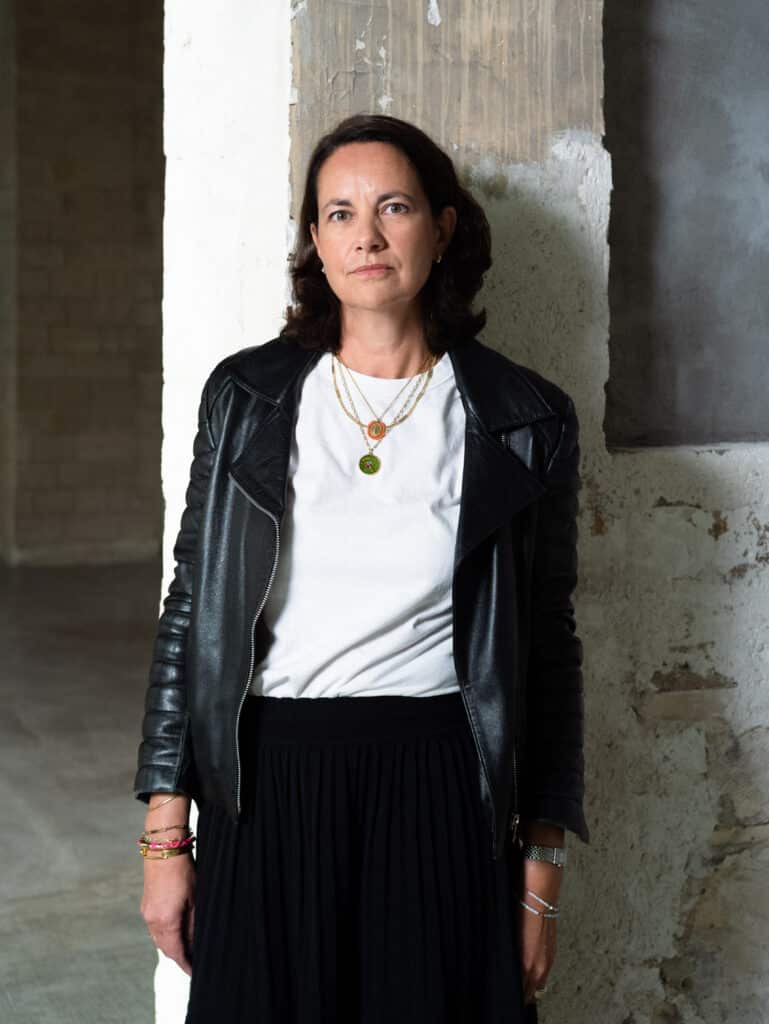
Adeline Dargent (CSR Manager, FFPPF): “Traceability is a major issue”
Faced with climate change and increasing ethical and CSR regulations, the Fédération Française du Prêt-à-Porter Féminin (FFPPF) is supporting fashion companies in their transformation. To shed some light on the subject, we spoke to Adeline Dargent, in charge of CSR issues and General Delegate of the Syndicat de Paris de la Mode Féminine (SPMF). She explains the tools and projects put in place by the Federation to promote sustainable fashion.
When did you start helping SMEs with their CSR transformation?
I have a legal background in employment law and ethics is a subject that is particularly close to my heart, and one that ties in with CSR issues. At the Federation, we’re looking at two main areas: the environmental and social aspects, particularly with fast fashion.
In 2017, when Pierre-François Le Louët (President of the NellyRodi agency) became President of the Fédération du Prêt-à-Porter Féminin, we started talking about CSR support for fashion companies, as many of them were at a loss as to what to do, particularly to reduce their impact on the environment. Today, we see new business models emerging, companies built on these ethical values, so the aim was to transform existing business models.
What tools do you make available to companies?
Because the fashion industry has a highly fragmented and international value chain, we find it very difficult to control everything that happens at every level. I work a lot with the Fédération de la Maille, de la Lingerie et du Balnéaire and we have chosen to set up educational tools, by creating guides and workshops to support these companies – which are mainly SMEs – thanks to the subsidies allocated by our development committee (DEFI). And the only DEFI eligibility criterion for support is to make warp and weft products.
In 2019, we brought out a guide to responsible sourcing. The supply chain seemed to us to be a priority subject to deal with, which we then divided into workshops. This tool is always used in companies to ensure that all approaches are consistent.
Two years later, we published a guide to eco-design, entitled : How to eco-design your brand? Your collections ? What is the life cycle of a product? What materials should I use? etc. This tool is designed to inspire companies to redirect and restructure their business model and values.
2022 saw the development of a new guide to responsible communication, which was also broken down into workshops. Indeed, once companies have dealt with and implemented these various issues, communication with consumers – always correct and without dissonance – is fundamental. It also means involving our collaborators so that they fully understand what is at stake.
At the same time, we realised that some of the companies we were working with on responsible communication had gaps in the basic strategy to be followed, and our support enabled them to rework it, in the form of modules, at each stage.
What about the french law on Duty of Vigilance…?
(Reminder: in France, the Duty of Vigilance Act requires ordering companies to strength en their supplier risk management systems, in particular through on-site audits and knowledge of supply chains).
In the near future, we will be offering a tool reserved exclusively for members of the FFPPF and the FMLB. It will focus on the management of the Duty of Vigilance Act in our companies, whatever their size.
Since 2017, this law has been relatively little applied in the sector because our companies are not directly affected. They meet thresholds that are lower than those that make the Duty of Vigilance compulsory. On the other hand, European regulations are changing and we remain convinced that this is part of a CSR strategy, that you have to identify the risks in your value chain and that it’s important to map them out.
.. and other laws : AGEC and Climate and Resilience?
At the same time, regulations have accelerated, particularly in France. The AGEC law, which was published in 2020 and came into force for certain companies, made consumer information, including traceability, mandatory on the 1st of January 2023.
And there are others ! On August the 22nd of 2021, another law arrived : the Climate and Resilience Act, which aims to massively reduce our greenhouse gas (GHG) emissions, in a spirit of social justice. Article 2 of the Climate and Resilience Act states that environmental labelling must provide information on “the ecological footprint of the goods and services considered over their entire life cycle”.
As far as food is concerned in France, there has been a lot of talk about the Nutri-score, the nutritional labelling system on the front of packaging created by Santé publique France to help consumers make informed choices about the nutritional composition of products. With fashion, it’s much more complicated ! When it comes to environmental labelling, we won’t be using this “A, B, C, D” punctuation system with a colour scale. This is still under consideration.
If we want to meet the 8 impact criteria announced by the French government last March for the future environmental score (i.e. water consumption, physical durability of textiles, production conditions, use of pesticides and chemicals, release of microplastics, recovery of recycled materials, recovery of reconditioned textiles and impact of fast fashion), we have a major traceability issue to work out. These studies and research projects were carried out with DEFI and the Comité Stratégique de la Filière (CSF) Mode et Luxe: we provide companies with tools to help them make their choices and raise their awareness of this issue.
Consequently, traceability is one of the major challenges of the next two years. All this entails reorganisation, particularly in terms of finance and human resources, as a number of departments within the company will be affected (studio, production, IT Solution Development, etc.).
Tell us about “Green Ressources”: what is it all about?
On the Federation’s website, we have put together a directory of solutions to help brands succeed or accelerate their transition to a more sustainable model. This tool helps companies to identify the skills they need and find their service providers: consultancies, business coaches, second-hand or recycling specialists, etc. This CSR ecosystem is selected by a committee of ten experts who validate them.
What will happen on January 1st 2024?
The method for environmental labelling, which was scheduled for 2024, has not yet been decided. In terms of the European timetable, the deadlines for implementing these changes are slower than in France. Harmonising methodologies is quite difficult ! So next year, environmental labelling will not be compulsory; it will be voluntary and regulated. We can only hope that by 2025 it will be compulsory…
What challenges do you face on a daily basis ?
The biggest challenge is to get as many companies on board as possible. Even if you offer them free support, you still have to go out and convince them. We’re dealing with small companies that have a whole host of constraints, so it’s difficult for them to take a step back, partly on these issues, which are sometimes seen as a constraint. What’s more, some companies no longer want to hear about CSR because it’s “too complicated and restrictive”.
The FFPPF is also involved in fast fashion : what is your opinion on this subject?
We have research projects underway to take stock of fast fashion. And when it comes to the big Chinese ultra fast fashion groups, I think we need to avoid talking about them too much and make consumers feel less guilty. The focus should be more on good practice. Consumers are intelligent enough to realise, at some point, that they need to buy more responsible products, provided they don’t cost much more.
“Awareness and change come one step at a time; we have to be humble enough to recognise that.”
Adeline Dargent
What are your projects ?
We will continue to develop educational and accessible tools, because our aim is to help as many businesses as possible make the ecological transition.
We’re also going to continue to lobby public authorities, to apply for budgets – and that’s our role as a Federation – to ensure that all these methodologies are not too costly for companies to implement. The important thing is that they work on the traceability of their products, a sine qua non if they are to survive in the market.
Photo : Adeline Dargent







